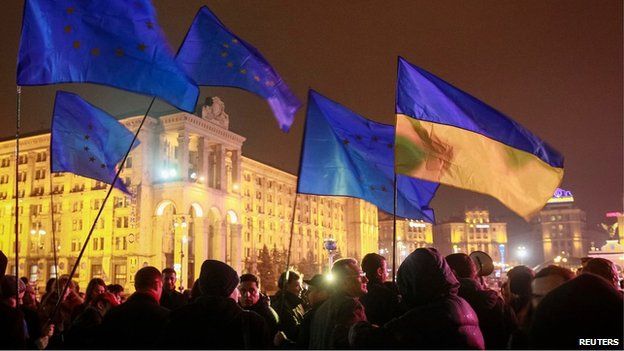European Square: Hashtag of Ukraine protest
- Published

You wouldn't necessarily expect the European Union to be such a rallying cry in Ukraine, but Ukrainians are so enraged by a government decision to suspend trade deal negotiations with the EU that they have been rallying protesters under the hashtag #євромайдан ("European Square").
First tweeted early on Thursday morning, the hashtag had been used more than 21,000 times by Friday as overnight opposition demonstrations were held in the cities of Donetsk, Ivano-Frankovsk, Lutsk, Uzhgorod and Lviv. Kiev's Independence Square is a focal point for protests - just as it was during 2004's so-called Orange Revolution. Then, protesters were bolstered not just by their strength in numbers but also by SMS messages: Mobile phones were key for organising protests, avoiding police cordons and ordering supplies. Now the protests are mostly being galvanised by social media. Ukrainian digital marketing expert Maksym Savanevskyy says there has been an explosion of calls-to-arms online since the government's decision on EU talks.
WBC heavyweight boxing champion and would-be Ukrainian president Vitali Klitschko tweeted: "Friends! All those who came to Maydan [Independence Square], well done! Who has not done it yet - join us now!" The protest hashtag was also gaining traction on the VKontakte social media network, and Mr Klitschko tweeted a link to a speech he made on the square saying that once the protest was 100,000-strong, "we'll go for Yanukovych" - referring to President Viktor Yanukovych.
But although Facebook, Twitter and other social media are buzzing with rallying calls for a major protest on Sunday, questions remain as to whether that will translate into big numbers on the rain-soaked streets of Kiev. "Many people tell you of their protest fatigue, and many believe that not just the numbers but the spirit of the Orange Revolution will hardly be repeated - whatever the tools," says the former head of the BBC's Ukrainian service Olexiy Solohubenko.
Reporting by Michael Hirst